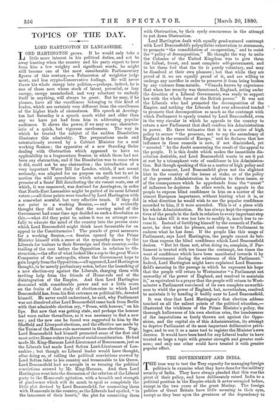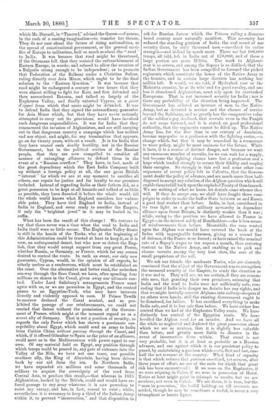THE GOVERNMENT AND INDIA. T HE true way to test the
Tory capacity for managing foreign polities is to examine what they have done for the military security of India. They have always pleaded that this was the pivot of their policy, and have deliberately raised India to a political position in the Empire which it never occupied before, except in the two years of the great Mutiny. The foreign politics of Great Britain have little meaning in their eyes, except as they bear upon the greatness of the dependency to which Mr. Disraeli, in "Tancred," advised the Queen—of course, in the rush of a soaring imagination—to transfer her throne. They do not care about the future of rising nationalities, or the spread of constitutional government, or the general sacri- fice of Europe to militarism, half so much as about the "road" to India. It was because that road might be threatened, if the Ottomans fell, that they resisted the enfranchisement of Eastern Europe, in words; and refused to allow the creation of a Bulgaria strong enough to be independent; or to promote that Federation of the Balkans under a Christian Sultan, ruling directly over Asia Minor, which ought to be the final solution to the "Eastern Question." It was because that road might be endangered a century or two hence that they were almost willing to fight for Kars, and first defended and then surrendered Batoum, and talked so largely of the Euphrates Valley, and finally extorted Cyprus, as a point dappui from which that route might be defended. It was to defend India that they signed the extraordinary guarantee for Asia Minor which, but that they have never seriously attempted to carry out its provisions, would have involved such dangerous responsibilities. It was for India that they commenced the invasion of Afghanistan, and are still carrying out in that dangerous country a campaign which has neither end nor object, and might, for any termination that appears, go on for twenty years, without a result. ,It is for India that they have roused such deadly hostility, not in the Russian Government, but in the political section of the Russian people, that they are now compelled to consider all manner of entangling alliances to defend them in the event of a "Russian overflow." They have, in fact, made of the great dependency which the East India Company built up without a foreign policy at all, the one great British " interest " for which we are at any moment to sacrifice all others, our repute for justice and for loyalty to our promises included. Instead of regarding India as their fathers did, as a great possession to be kept at all hazards and talked of as little as possible, they have flaunted it before the whole world, till the whole world knows what England considers her vulner- able point. They have tied England to India, instead of India to England, and seem ready to sacrifice the Empire, if only the "brightest jewel" in it may be buried in its coffin.
What has been the result of this change ? We venture to say that there never was a time when the road to India and India itself were so little secure. The Euphrates-Valley Route is still in the hands of the Turks, who at the beginning of this Administration could be trusted at least to keep it, as it is now, an unfrequented desert, but who now so detest the Eng- lish, that they would accept support from any great Power, whether Russia, or Germany, or France, which for any reason desired to control the route. In such an event, our only new guarantee, Cyprus, would, in the opinion of all experts, be utterly useless as a rendezvous, which must be established on the coast. Over the alternative and better road, the unbroken sea-way through the Suez Canal, we have, after spending four millions on shares in the Canal, given away our ultimate con- trol. Under Lord Salisbury's arrangements France must agree with us, or we are powerless in Egypt, and the control passes to an Egyptian-Turk, who may have interests directly and violently opposed to ours. If Prince Tewfik to-morrow declared the Canal neutral, and so pro- hibited the passage of our reinforcements, we could not rescind that decree without the permission of the Govern- ment of France, which might at the moment regard us as a secret ally of Germany. That is not a position of security, as regards the only Power which has shown a passionate sus- ceptibility about Egypt, which could send an army to India from Cochin China without passing through the Canal, and which, if it offered Gibraltar to Spain as the price of an alliance, could meet us in the Mediterranean with power equal to our own. Of any material hold on Egypt, any position through which troops could be poured in, any gate of entrance into the Valley of the Nile, we have not one trace, our possible southern ally, the King of Abyssinia, having been driven back by our aid from the sea. In Northern India, we have expended six millions and some thousands of soldiers to acquire the sovereignty of the road from Central Asia, to produce this result,—that whereas in 1875 Afghanistan, backed by the British, could and would have re- fused passage to any army whatever, it is zow powerless to resist any enemy, and has, in fact, ceased to exist ; nevertheless, it is necessary to keep a third of the Indian Army within it, to prevent "insurrection," and that disposition to ask for Russian favour which the Princes ruling a dismem- bered country must naturally manifest. This necessity has reduced the standing garrison of India, the real secret of our security there, by sixty thousand men—one-third its entire strength—and indeed by much more. There are but 106,000 troops, all told, left in India out of 170,000, and of these a large portion are mere Militia. The work in Afghani- stan is so severe, and among the Sepoys is so disliked, that the Indian Government has been compelled to forward the picked regiments which constitute the bones of the Native Army to the frontier, and in certain large districts has nothing but militia left. It would, we are told, if Hydrabad rose or the Mahratta country, be at its wits' end for good cavalry, and un- less it abandoned Afghanistan, must rely upon its overtasked Europeans. That is not increased security for India ; nor is there any probability of the situation being improved. The Government has ordered an increase of men to the Native Army, but so detested is service and the chance of service beyond the Suleiman, and so greatly has the comparative value of the soldier's pay declined, that recruits even in the Punjab do not come forward, and it is stated, on good professional authority, that the regiments cannot be filled up. The Native Army has, for the first time in our century of dominion, become unpopular as a profession with the fighting castes,—a change which, but that it may be remedied by a recurrence to wiser policy, might be most ominous for the future. While it lasts, it is a source of distinct danger, not because we want any enormous number of recruits, for we can wait for a supply, but because the fighting classes have lost a profession and a hope which tended strongly to secure their fidelity and employ their energies. So strongly is this evil and some other con- sequences of recent policy felt in Calcutta, that the Govern- ment doubt the policy of advance, and are much more than half. disposedto accept any solution of the Afghan question which will enable them to fall back upon the exploded Treaty of Gundamuck. We are writing of what we know, let denials come whence they will. If they do accept one, we shall have fought three cam- paigns in order to make the buffer State between us and Russia a good deal weaker than before. India, in fact, considered in its true light, as a great military monarchy in dependent alliance upon Great Britain, is distinctly weaker than it was ; while, owing to the position we have allowed to France in Egypt—in the interest solely of Bondholders—she is less secure of reinforcements than before. Meanwhile, the sum wasted upon the Afghan war would have covered the bank of the Indus with impregnable fortresses, giving us a second line of defence, if the Passes were forced ; or have raised the nominal rate of a Sepoy's wages to ten rupees a month, thus restoring content to the Native Army, and enabling us to pick and choose recruits among the very best class, the sons of the small proprietors of the soil.
We ask our friends the moderate Tories, who are sincerely convinced that the object of the Government was to strengthen the menaced security of the Empire, to study the situation as it was and is. They will see, we are certain, if they are reason- able men, that granting their own preinisses, assuming that India and the road to India were not sufficiently safe, con- ceding that if India is in danger no Asiatic has any rights, and that we might lawfully convert Afghans into railway-sleepers if no others were handy, still the existing Government ought to be dismissed, for failure. It has sacrificed everything to make India safe, and it is less safe than before. We have rather less control than we had of the Euphrates Valley route. We have distinctly less control of the Egyptian route. We have levelled the Afghan road for an invader. And we have all the while so neglected and depleted the great possession about which we are so anxious, that it is slightly less valuable than before, and greatly more liable to disaster in the event of insurrection from within. That event is not very probable, but it is at least as probable as a Russian advance, and one against which it is our persistent policy to guard, by maintaining a garrison which costs, first and last, one- half the net revenue of the country. What kind of capacity is that which reduces that gariison one-third, yet secures, after three years of effort, no one of the ends for which that great risk has been encountered ? If we were on the Euphrates, if we were reigning in Cairo, if we were in possession of Herat, Tories at least might point in triumph to results, but we are nowhere, not even in Cabul. We are there, it is true, but the "man in possession," the bailiff holding on till accounts are settled, though he may be sometimes a useful, is never a very triumphant or heroic figure.



































 Previous page
Previous page